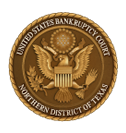You are here
FAQs
-
Is there a way to get BOTH an email message notice (Send a notice for each filing) and the daily summary report (Send a Daily Summary Report)?
CM/ECF is configured to send one or the other, it does not have the capablitity to send both
-
What is a Trustee?
A trustee is a person who administers bankruptcy cases. The trustee does not represent the debtor or any individual creditor and cannot give legal advice. Rather, the trustee has independent rights and duties that are set forth in the Bankruptcy Code. In a chapter 7 case, the trustee may take possession of the debtor's assets, sell them, and distribute the proceeds to creditors. In a chapter 13 case, the trustee administers the debtor's plan, and pays the creditors. The trustee will also oversee the first meeting of creditors.
-
What is the difference between Chapters 7, 11 and 13?
Chapter 7: The chapter of the Bankruptcy Code providing for "liquidation," ( i.e., the sale of a debtor's nonexempt property and the distribution of the proceeds to creditors.)
Chapter 11: The chapter of the Bankruptcy Code providing (generally) for reorganization, usually involving a corporation or partnership. (A chapter 11 debtor usually proposes a plan of reorganization to keep its business alive and pay creditors over time. People in business or individuals can also seek relief in chapter 11.)
Chapter 13: The chapter of the Bankruptcy Code providing for adjustment of debts of an individual with regular income. (Chapter 13 allows a debtor to keep property and pay debts over time, usually three to five years.)
-
Can the clerk's office assist in filing, writing motions, or filling out forms if a party is not represented by an attorney?
The clerk's office is prohibited from helping a pro- se filer in filing, writing motions, or filling out forms. If a party does not have attorney representation, they may be able to obtain assistance from one of the following two entities: Dallas Bar Association - (214) 220-7400; Legal Aid of Northwest Texas (214) 748-1234. These groups are not affiliated with the Court.
Additionally, the clerk's office website provides a link to the local rules as well as the Federal Rules of Bankruptcy Procedure and the Federal Bankruptcy Code. The burden lies on the pro-se filer to make themselves familiar with these rules.
-
How long does the ECF system take to send out the emails?
The ECF system usually sends out emails within 5 minutes of completion of the electronic filing so there is no real delay. If you are exeriencing delays, check on the frequency with which you have set your email server to check for new messages.
-
Can a client or an interested party (non-attorney) receive emails on a case?
You can add a secondary email address by using the Maintain My ECF Account option under Utilities. Any email addresses you add will receive everything that the primary email account gets in all his or her cases. This can be confusing for the secondary if they start to receive emails regarding cases for which they are not involved. Instead, you might want to set up a RULE on your email server or email client to automatically forward case emails to anyone you wish.
-
Can secondary email addresses get emails on certain cases only?
No. Secondary email addresses will receive emails for every case that the primary email gets. It works exactly like a "CC" (carbon-copy) address.
-
Why are the menu events not displayed when I click on Bankruptcy?
The reason you do not have any menu options is because the attorney account is locked due to pending filing fees that have not been paid. You will need to log in to ECF, click on "Utilities/Internet Payments Due" A pop-up window will appear for you to pay the outstanding fees. Click Pay Now, and follow the prompts.
Once the fees have been paid, access to your account will be restored.
If access to your account is not restored, refresh your screen.
-
How should a document (PDF) be signed electronically?
All parties signing a PDF document should use the /s/ Name.
-
Where do you download the necessary forms needed for filing?
You can obtain them on the court's website at www.txnb.uscourts.gov. Choose the Tab that says Forms, then choose National Forms. You may also go directly to www.uscourts.gov to locate the forms.
